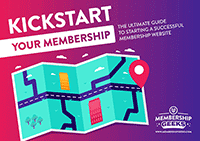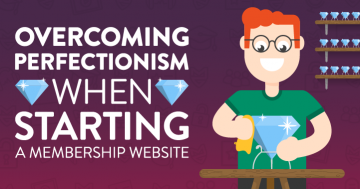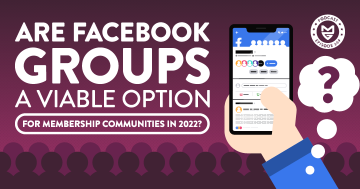Should you create a membership if you have no discernible skills or expertise?
Most membership sites involve some sort of skill, knowledge, or experience that you let people tap into in order to help them achieve a result.
But if you currently lack expertise, does that mean you can’t enter the membership arena?
I won’t lie to you…
It’ll be a much harder sell when there’s no evidence of what you personally have to offer.
You can’t just set up a membership site for people who feel like giving you money.
If you feel like you don’t have the necessary skills or any particular area of expertise to build a membership around, there are four strategies you can follow and one we recommend you don’t try out.
We’ll start with the strategy we don’t recommend for starting a membership without skill or authority.
Faking It
So many people put a lot of stock in pretending they're an expert and hoping the gaps will fill themselves in.
Anything that involves misrepresentating yourself and misleading your members, and tricking people into joining is a massive no-no.
You can go ahead and throw this strategy out the window.
There are people in the world of online marketing who will tell you to do this. They see nothing wrong with BS-ing your audience if it means you can make a fast buck, but that’s not what we’re about at all.

Sure, I have “experience”…
Besides the blatant ethical problems of this approach, there’s also the fact that membership sites give you no way to hide.
Your members are going to be around you and engaging with you. You’re relying on them getting enough value to stick around in your membership, but if you’re faking and not delivering on your promises, you’re going to get found out very quickly.
If you’re thinking of starting a membership site and faking your expertise, don’t.
There are far more solid strategies to build a membership without skills or authority, including the following four tactics:
1. Get Good at Something
If you don’t have knowledge, skills, or expertise, get them.
Pick one thing and throw yourself into it completely.
When it comes to memberships and online courses, if you can become knowledgeable about a specific topic, you’ll be far more compelling than if you were a master of everything.
Take the industry or arena you want to be in, choose what you want to dive into, and develop some hard core skills in that.
This can give you a huge advantage.
For example, if you want to be in online marketing, you might pick a trending topic like live video.
Spend the next 3-6 months becoming as knowledgeable as anyone could become on Facebook live.
Because this is such a specific area, it won’t take you the typical 10,000 hours to develop mastery.
You could figure out everything you need to know to the degree that you could feel confident about teaching other people that stuff in 3 months.
If you don’t have skills or knowledge, get it.
2. Be the Facilitator
Instead of being the expert, be the person with the platform that brings other experts together.
Your membership could consist entirely of content created by other people who do have the skills, knowledge, and expertise in your area.
The service you’re providing to your members is giving them a place to access all that information.
If you’re good at networking and developing connections with people, your role as a membership site owner could simply be to negotiate guest experts to come onto your site and create content for your audience through live webinars, pre-recorded workshops, and so on.
You could negotiate perks, discounts, tools, and softwares with companies and service providers in the niche you’re serving to get some great deals for your members.
You don’t need to be a subject matter expert in order to do that.
All you need is a passion and interest in the market you’re looking to serve, networking skills, and the confidence to get out there.
3. Focus on Community
Another option is to run an interest-based community where it isn’t about learning something or traveling down a journey, it’s about giving people a place to come together and participate in their shared interest in a particular topic.
You don’t need to be an authority if you’re creating a community based on a shared interest rather than a shared goal.
People might not pay as much to be a part of a community, but you can make the core community free and have a paid element that gives people access to advanced profiles, private forums, and so on.
The ability to monetize this sort of membership is somewhat limited, but you just have to think about it differently.
4. Sell PLR Material
This strategy is rather old school, and wouldn’t be my first choice, but it works for some people.
PLR stands for private label rights.
This is basically where you purchase the right to sell material that other people created.
White-labeling material like this can be a good thing if someone is an expert in a specific topic and you can partner with them to put that material in your membership.
There’s nothing wrong with that whatsoever.
What you typically find with PLR memberships is hundreds and thousands of people selling the same materials, many of which are of questionable quality and outdated.
Some people will put this stuff in their membership as part of their fake it till you make it approach and that’s never a good solution.
That being said, you can certainly create a membership that has great value, that you run in a positive, ethical way with PLR material.
Spend time to research, validate, and hand-pick material that you feel is high quality, not just cheap and you may be able to create a valuable, profitable membership site.





